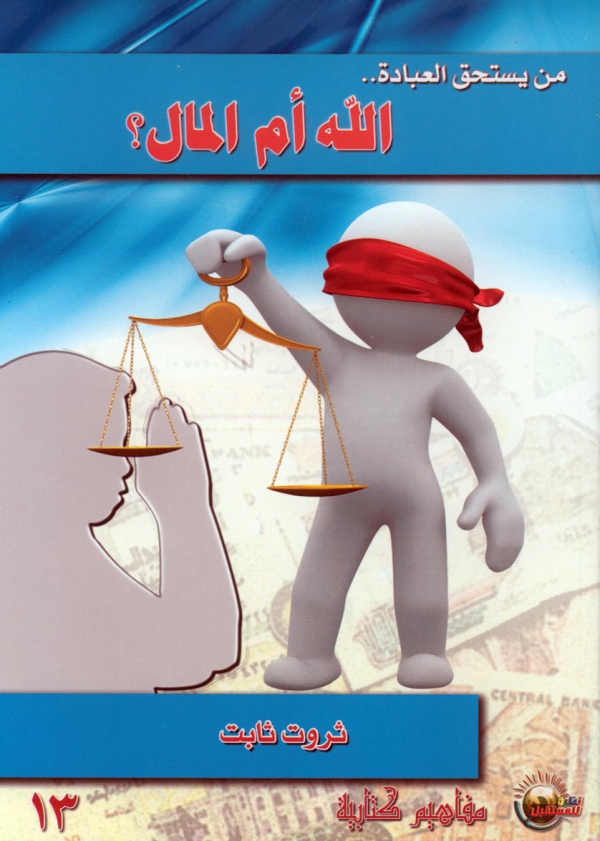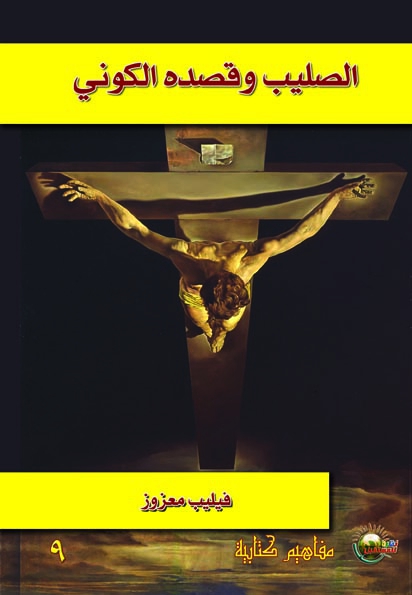Biblical Concepts
There is no doubt that we are all prone to stumbling in our spiritual life due to the wrong concepts of theology which we have formed in our minds. This series is designed to discuss key spiritual concepts in a way that reveals and clarifies biblical truths and is comprehensible to the contemporary Arabic mind.
We Believe In One God
الكاتب: Rev. Nasrallah Zakaria
الناشر: Vision For Future
In his book, "We believe in one God," Rev. Nasrallah explains in detail the oneness of God in Christianity and the meaning of the Trinity. The author presents this study to every sincere student who wants to know what Christians believe and consider carefully the idea of the oneness of God and the Trinity. The medium size book is 112 pages long. The writer is keen to present a study that includes all aspects of this topic in an easy and understandable way to the reader.
The writer explains at the beginning that Christians believe in one God. The heart of the Christian faith acknowledges that "there is no god but Allah." This is based on what the Bible says: "For there is one God" (1 Timothy 2:5).
The author explains that the worship of the one God is rooted in history. It is an important spiritual doctrine of worship in history and humanity. The worship of one God is attributed to the Prophet Abraham, God's friend. The fact that God called Abraham to leave his land and his clan has different meanings and repercussions. These differences bring with them a shift in the history of worship in general and the concept of the oneness of God in particular.
The divine declaration in the Bible says that God is one. God did not declare himself as one God, but He revealed himself as Trinity. We cannot say that the doctrine of the oneness of God and of the Trinity, in Christianity, came about as a result of philosophical study or rational thinking. It is not easy for the mind to accept this matter, the source of this belief is God himself. God declared himself as Trinity in his Persons. Christians defend the oneness of God and Trinity by declaring their faith in the one God, as he reveals himself in his Word, the Bible.
The history of Christianity witnesses to how the Church has strongly resisted those who called for the existence of more than one god. Christianity believes in the doctrine of the oneness of God. It believes that God is one and He is the Creator and the Lord of history. He controls human fate.
Next, the author explains the meaning of Trinity in Christianity and answers the question of whether Trinity has the same meaning in ancient religions.
Writing about the meaning of "Person," the writer says, "The word, "Person," appears in Christian theology at the beginning of the 4th century. The origin of the word is from the Syriac language. This word is used to express excellence without separation. It was translated in the Bible as "the essence." It meant "the way of existence," or something existing in itself. The word "Persona" was used in Latin to express any of the Persons of God. At that time, it meant "a way of existence." When we talk about the word "Person" or the three Persons, we mean that each person is distinguished from the two other Persons, without being separate from them. This use of the word "Person" refers to a living Being that can say about Himself, "I," and about the other Person "You." We can say "He" also. We can see this in the Bible, "You are my son; today I have become your father," (Psalm 2:7).
Rev. Nasrallah discusses many of the questions that occupy Christians and non-Christians including:
- What do we mean by the oneness of God?
- What is meant by "God is one?"
- What is the meaning of fatherhood in the doctrine of the oneness of God and trinity?
- When was God a father?
- Does God become a father only when he created man or before the creation?
- What is the meaning of Son in the doctrine of the oneness of God and trinity?
The writer says, "Subordinationism or hierarchy is a common mistake in the understanding of the doctrine of the oneness of God." The Greek fathers believe that God the Father is the source of the other Persons. Thus, the son and the Holy Spirit are subordinate to God the Father.
Subordinationism in essence does not exist in the oneness of the triune God. The essence is one God. However, subordinationism is intended only to be functional hierarchy. It reflects the principle of subordination between the Trinity.
Why should the oneness of God be a trinity?
Rev. Nasrallah says, "We certainly know that God exists and has attributes, otherwise He would not exist. Since we believe that God is everlasting and has everlasting attributes, there is no time when God does not exercise his attributes, because this means that a change occurs in God. God is unchanging.
If we say that the attributes of God waited for the creation to be revealed and activated, then God would not depend on himself in this case. He would be limited. We cannot say that God is limited, making him similar to his creation!
The writer says, quoting Dr. Imad Shehadeh, "As long as there is diversity to the practice of God's attributes without (aside from, beside, outside of, all the while sustaining) Creation, and as long as every Person within such diversity must work as an actor and an object in that mutual relationship, then the relationships among the Persons needs the work of a joint, besides their individual work. It is imperative for two Persons to play the roles of the actor and the object, but, to be complete, this relationship requires a third Person who also works as an object or as an actor, between the other two. If they are not three Persons, the relationship will necessarily lose the singularity and fellowship, which are necessary and main characteristics for full everlasting relationship. Three Persons meet all requirements for mutual, common and full relationship. All common elements in the integrated relationship are represented in the number three. For example, the Father and the Son may take the actor role in their common work of revealing God's eternal love, and the Holy Spirit is then the object. Or, the Son and Holy Spirit may be involved in the joint work of actor, so that here the Father acts as the object. The Father may be the actor and the Son at which point, the Holy Spirit takes on the role of object. No less than three can be involved in such a relationship."
Quoting Mr. Awad Samaan, Rev. Nasrallah explains that the three of the Triune Persons makes theirs the complete and universal number. The property of oneness cannot be achieved in a lower number. There is a general belief that three is the first full number. We say, "A chord of three strands is not quickly torn apart," and "third time lucky." In mathematics, the first form has three sides and the first volume has three dimensions.
The writer asserts that trinity is not a mathematical equation combining the Father, the Son and the Holy Spirit, and the result will be three gods. The Christian faith affirms that the trinity simply represents one God.
Rev. Nasrallah mentioned that a man of God once wrote, "If you tried to understand the Trinity, you would lose your mind. If you tried to ignore the Trinity, you would lose your life." We have to differentiate between something that is more superior to the mind, and something else that does not agree with it. Many things are superior to our minds or our understanding, and we cannot know all their details, but they are consistent with the mind, even if they are beyond the mind's ability to perceive them.
Finally, the writer raises some important questions such as:
- Why do we believe in the trinity as long as we conclude that God is one?
- Would not it be easier and better for us to believe in one God?
- What is the importance of the oneness of the triune God?
- What is the effectiveness of the oneness of the triune God in our Christian life?


















